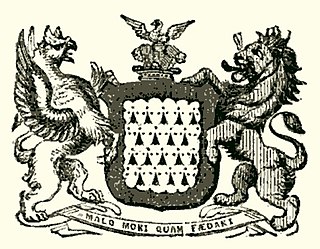
Sir Edward Poynings KG was an English soldier, administrator and diplomat, and Lord Deputy of Ireland under King Henry VII of England.
The Lord High Chancellor of Ireland was the highest judicial office in Ireland until the establishment of the Irish Free State in 1922. From 1721 to 1801, it was also the highest political office of the Irish Parliament: the Chancellor was Speaker of the Irish House of Lords. The Lord Chancellor was also Lord Keeper of the Great Seal of Ireland. In all three respects, the office mirrored the Lord High Chancellor of Great Britain.
The Lord Deputy was the representative of the monarch and head of the Irish executive under English rule, during the Lordship of Ireland and then the Kingdom of Ireland. He deputised prior to 1523 for the Viceroy of Ireland. The plural form is Lords Deputy.
Sir James OrmondaliasButler was the son of John Butler, 6th Earl of Ormond. He was Lord Treasurer of Ireland from 1492 to 1494, and helped to defend the Lordship of Ireland against the forces of Perkin Warbeck. He was murdered by Sir Piers Butler on 17 July 1497. Piers would later hold the title of Earl of Ormond.
Alexander Plunket was an Irish statesman and judge of the fifteenth century.

Rowland FitzEustace, 1st Baron Portlester was an Irish peer, statesman and judge. He was one of the dominant political figures in late fifteenth-century Ireland, rivalled in influence probably only by his son-in-law Garret FitzGerald, the "Great" Earl of Kildare.
Sir Gerald Aylmer was an Irish judge in the time of Henry VIII, who played a key part in enforcing the Dissolution of the Monasteries. His numerous descendants included the Barons Aylmer.

John Barnewall, 3rd Baron Trimleston, was an Irish nobleman, judge and politician. He was the eldest son of Christopher Barnewall, 2nd Baron Trimlestown and his wife Elizabeth Plunket, daughter of Sir Thomas Fitz-Christopher Plunket of Rathmore, Lord Chief Justice of the King's Bench in Ireland and his second wife Marian Cruise. He succeeded his father as 3rd Baron about 1513. His father, like most of the Anglo-Irish aristocracy, had supported the claim of the pretender Lambert Simnel to the English throne in 1487. After the failure of Simnel's rebellion, he received a royal pardon.

Sir Jeffrey Gilbert (1674–1726) was an English barrister, judge and author who held office as Lord Chief Baron of the Exchequer in both Ireland and England. While he was serving as a judge in Ireland, a routine judgment he delivered unexpectedly led to a major political crisis, as a result of which he was briefly imprisoned. He later became renowned for his legal treatises, none of which were published in his lifetime.
Nicholas St Lawrence, 4th Baron Howth was a leading Irish soldier and statesman of the early Tudor period, who held the office of Lord Chancellor of Ireland.
Walter Fitzsimon was a statesman and cleric in Ireland in the reign of Henry VII, who held the offices of Archbishop of Dublin and Lord Chancellor of Ireland.
Sir Thomas Cusack (1490–1571) was an Anglo-Irish judge and statesman of the sixteenth century, who held the offices of Master of the Rolls in Ireland, Lord Chancellor of Ireland, and Chancellor of the Exchequer of Ireland, and sat in the Irish House of Commons. He was one of the most trusted and dependable Crown servants of his time, although he led a somewhat turbulent private life.
Sir Lucas Dillon, also called Luke, was a leading Irish barrister and judge of the Elizabethan era who held the offices of Attorney General for Ireland and Chief Baron of the Irish Exchequer. He supported the Lord Deputy Henry Sidney in the cess controversy and the Lord Deputy John Perrot in the Desmond Rebellions. He was held in high regard by Queen Elizabeth, but was accused by his enemies of corruption and maladministration.
Richard Delahide was an Irish judge of the sixteenth century, who held the offices of Chief Justice of the Irish Common Pleas and Chief Baron of the Irish Exchequer. His career was seriously damaged by the Rebellion of Silken Thomas, in which several members of his family played a leading part, and he was fortunate to escape permanent disgrace.
Patrick Bermingham (c.1460–1532) was an Irish judge and statesman of the Tudor period who held the offices of Lord Chief Justice of Ireland and Chancellor of the Exchequer of Ireland. He was a firm supporter of English rule in Ireland and enjoyed the confidence of Henry VIII, who regarded him as a mainstay of the Irish administration.
Nicholas de Balscote was an English-born official and judge in fourteenth-century Ireland. He attained high judicial office, but his career was damaged by a quarrel with King Edward II.
Sir William Darcy (c.1460–1540) was a leading Anglo-Irish statesman of the Pale in the early sixteenth century; for many years he held the office of Vice-Treasurer of Ireland. He wrote an influential treatise, The Decay of Ireland, which led to his being called "the father of the movement for political reformation in Ireland". He was a colourful and flamboyant character, whose exceptional height gave rise to his nickname "Great Darcy".
Oliver FitzEustace was an Irish judge. His appointment as Chief Baron of the Irish Exchequer was a surprising one since according to the leading historian of the Irish judiciary he appears to have been unable to speak.
Sir Thomas Kent was an Irish judge who held office as Chief Baron of the Irish Exchequer.
Thomas Cusacke, Cusack or de Cusack was an Irish barrister and judge, who held the offices of Attorney General for Ireland and Lord Chief Justice of Ireland. He should not be confused with his much younger cousin Sir Thomas Cusack, Lord Chancellor of Ireland, who was a child of about six when the elder Thomas died.